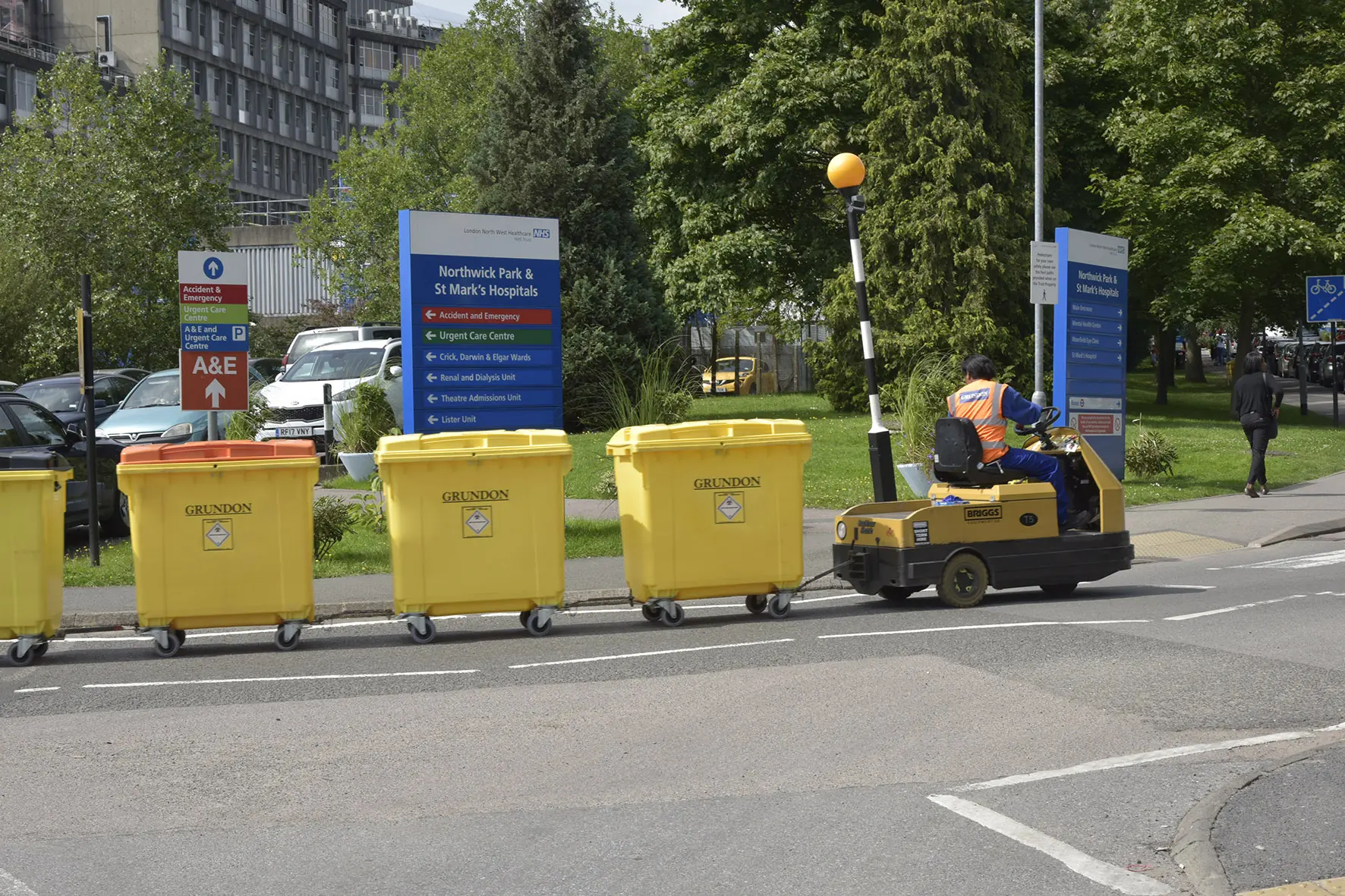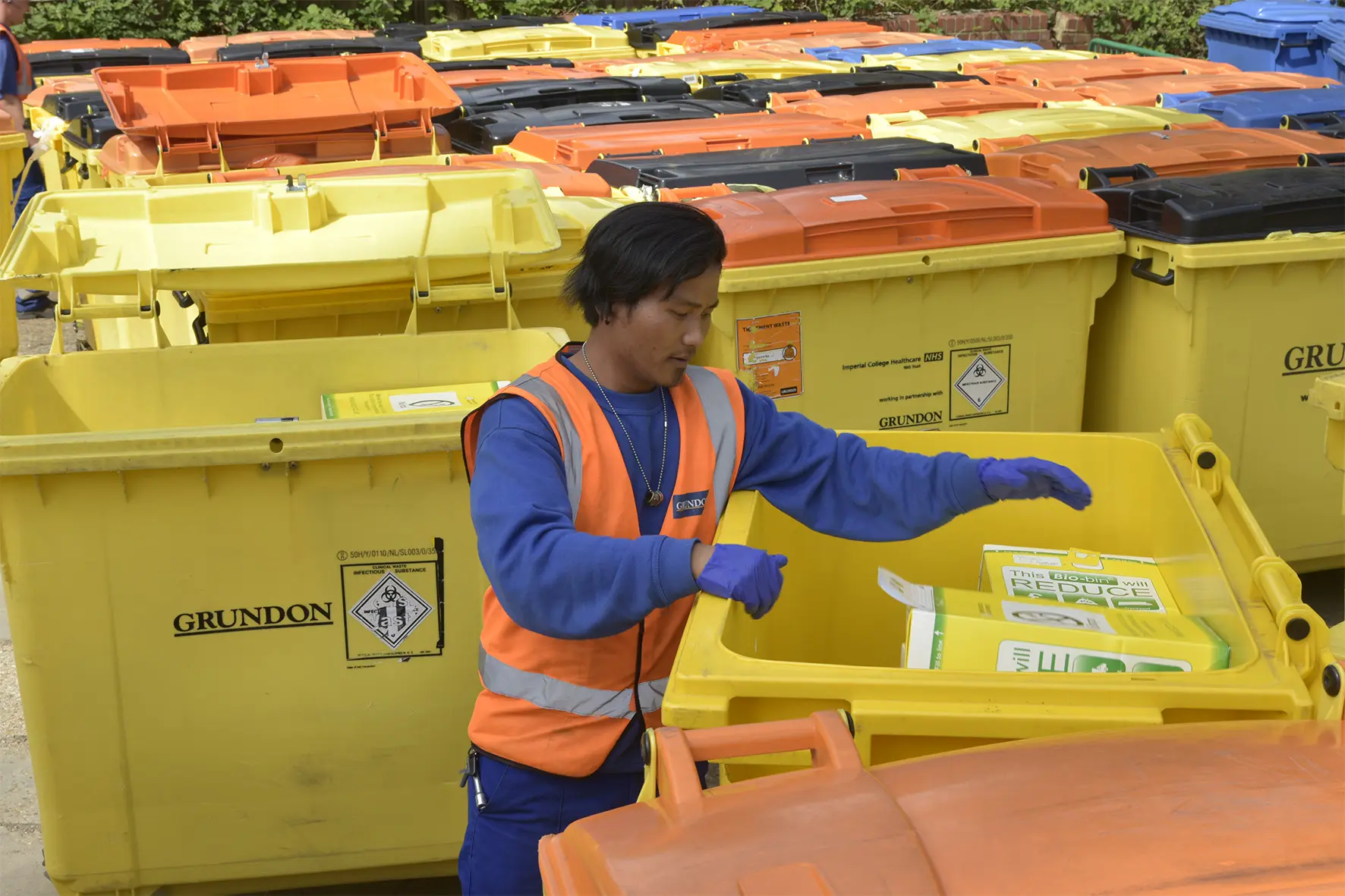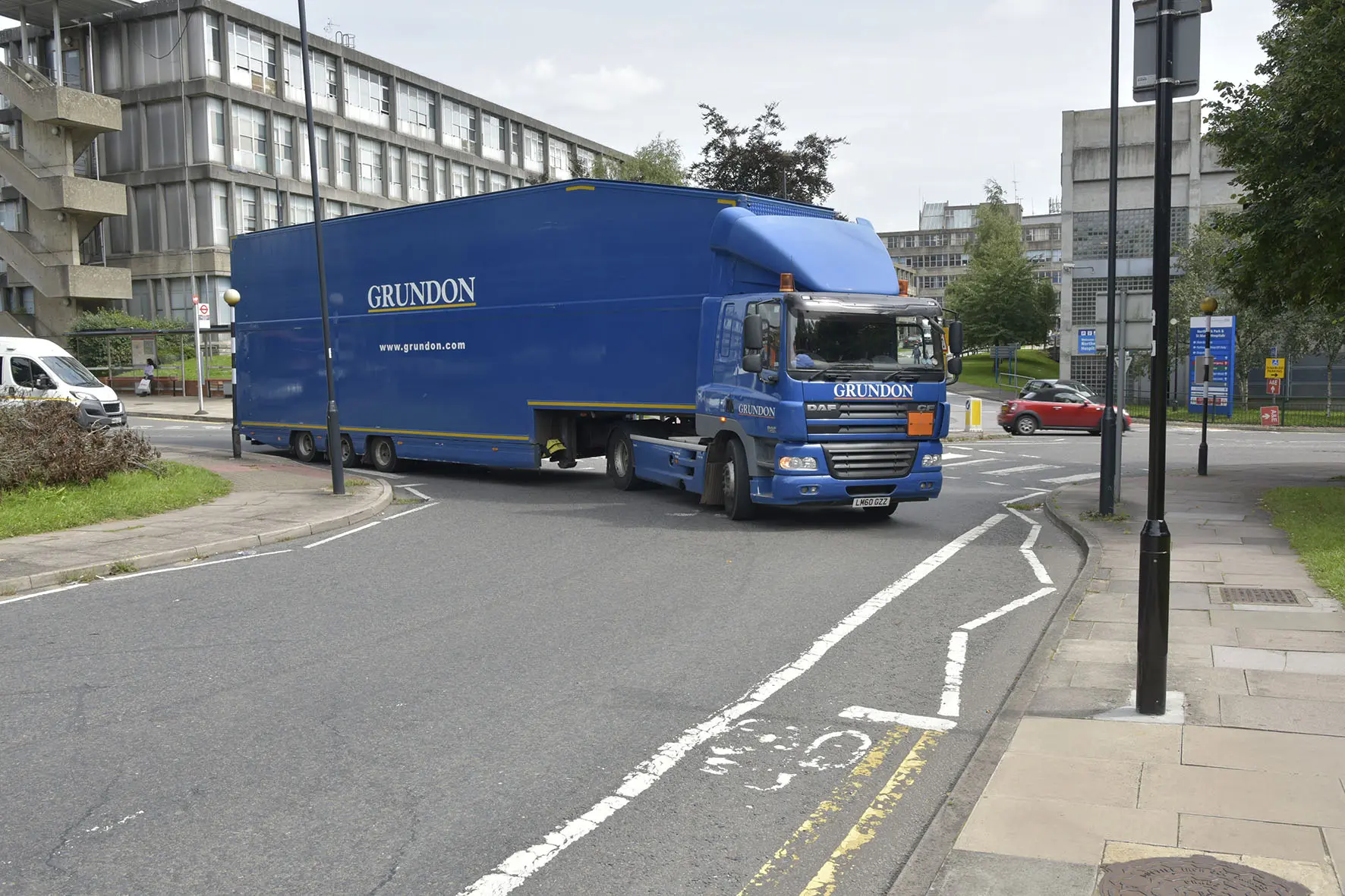Increased recycling rates, an on-site waste manager and the appointment of three dedicated waste team leaders, plus a comprehensive employee training programme, are reaping rewards for the London North West University Healthcare (LNWH) NHS Trust.
In the two years since Grundon Waste Management took over the contract to supply total waste management services at the Trust’s three acute hospitals and nine community sites, the focus has been on better management of waste and recycling, diversion of waste from landfill, improving communications, training and waste education and correct segregation.
The contract covers all healthcare waste, hazardous waste, domestic waste, recycling, food waste, WEEE and confidential waste across sites including Northwick Park and St Mark’s Hospitals, Central Middlesex Hospital and Ealing Hospital, as well as Clayponds Rehabilitation Hospital and Meadow House Hospice.

Key areas for success have included meeting the landfill diversion target within the first year, segregating offensive waste from the infectious waste stream, introduction of toner and ink cartridge recycling, improved signage, and better segregation of food waste.
One standout result in particular is a year-on-year 79% increase in the amount of cardboard now segregated and baled on-site at Northwick Park Hospital, prior to it being sent for recycling.
Scott Williams, Head of Contract Management, says Grundon’s appointment of Toye Ogunleye as Waste Manager (NHS Trust) based at Northwick Park Hospital, is making a real difference on a daily basis.
“Toye is very proactive, he drives innovation and gets results while our waste team leaders are on hand to deal with everyday enquiries,” says Scott. “Our third team waste leader was appointed in December and has enabled us to provide better staff coverage and supervision of the waste porters across all three sites.
“Now we can push ahead with even more focus on increasing recycling and optimising our service further still.”
It’s a system that is working well according to Brenda Brown, Facilities Contracts Manager for Northwick Park, St Mark’s Hospital and Ealing Hospital.
Sustainable management of clinical waste
“We chose to work with Grundon on the fact that they were able to provide a Total Waste Management service at a competitive cost which included innovative recycling ideas to reduce waste,” said Brenda.
“The Trust is very keen to improve on sustainability and is proactive in its support in improving waste management. The most important thing for us is to achieve a cost effective, environmentally friendly, sustainable waste management operation and delivery of reduction in waste, as well as raising awareness around responsible use of resources and sustainability in general.
“It was also very important to us that Grundon has a CarbonNeutral vehicle fleet, which helps contribute to the Trust’s overall CO2 reduction.”
Brenda says that since Grundon took over, it has made some real differences, citing:
- the achievement of zero waste to landfill, as general waste is now sent to Grundon’s Energy from Waste facility, where it generates green electricity for export to the National Grid
- an increase in department and ward waste audits, increasing awareness and reducing contamination
- recruitment of Waste Manager and Team Leaders providing operational support for waste porters
- implementation of waste carts for all clinical waste streams, signage in all waste holds, and asset tags for waste carts to enable the bins to be easily identified for the cleaning programme
In addition, she says having a dedicated waste manager and three team leaders has seen an improvement in the management and disposal of waste, adding: “The Trust have someone on-site to offer waste advice and the waste porters have on-site support, ability to raise concerns and deal with waste issues in ‘real time’.”
Employee engagement is a critical part of the success story and over the last year, Toye and his colleagues have worked hard to raise awareness through a series of activities.
“We’ve held roadshows at each of the three acute sites in April 2019 to engage with both NHS employees and the public on waste management issues, and further events will be organised during 2020,” says Toye.
“We are now recruiting for a Waste Champions Group formed of both Trust and contractor staff in order to help us to promote awareness and compliance at both ward and departmental levels.”
This has already started yielding results as both permanent and agency clinical staff now have the benefit of a direct number to call for enquiries and immediate clarification of any confusion about correct waste management practices.

Training
There has been a special focus on wards and departments which had the most frequent reports of non-conformances, with Grundon organising a training programme for both clinical and non-clinical staff in those locations. This enabled about 600 employees to undergo the training in 2018 – as a result, the number of non-conformance reports has dropped.
There are plans to expand the training to cover all clinical staff across the Trust and also incorporate into it into an online training tool, both for new employees as part of their induction process, and as a refresher course. All newly-opened wards will also now have Grundon’s Waste Awareness Training delivered to all clinical staff as part of the operational requirements of the Trust.
Based on feedback, Grundon has designed and supplied new signage and posters to help improve waste segregation leading to a continuing rise in recycling rates across the Trust. This is due to better segregation at source and the roll-out of corridor boxes for both mixed recycling and general waste.
Cardboard
Scott says the impressive increase in cardboard segregation is due to Grundon providing increased training and awareness for the Trust’s staff and contractors (domestic staff/cleaners) and the waste porters (employed by Grundon). In addition, where it is practical, cardboard is removed from general waste to avoid incorrect disposal.
Figures show that from April 2017-March 2018, 47.780 tonnes of cardboard were recycled, whereas for the same period 2018-2019, the figure rose to 88.400 tonnes.
The cardboard successes at Northwick Park Hospital have now been replicated at Ealing Hospital, where a cardboard baler has recently been installed.
Previously, Ealing Hospital’s cardboard was disposed of in mixed recycling, but baling it on-site will ensure the Trust can save money by gaining a rebate on segregating and sending it for separate recycling, and it will also help reduce contamination and improve the quality of the mixed recycling.
Offensive waste
Another major step forward has been the diversion of offensive waste from the clinical waste stream, which has seen a continued increase of over 3% across the Trust – 2017/18 vs 2018/19.
Offensive waste includes incontinence pads, nappies, tissues, wipes, dressings and other items contaminated with bodily fluids from non-infectious sources, all of which can be segregated and disposed of in yellow and black ‘tiger stripe’ sacks, as opposed to the clinical waste and infectious waste sacks, which are yellow and orange respectively.
Statistics show for April 2017-March 2018, a total of 618.22 tonnes of Offensive Waste was produced on-site, equivalent to 37% of the total amount of Clinical Waste (1,635.29 tonnes).
For the period April 2018-March 2019, the Offensive Waste figure had risen to 645.121 tonnes – delivering a further 3.3% (26.9 tonnes) increase in the diversion of Offensive Waste from the total Clinical Waste stream.
Because offensive waste is sent to Grundon’s Energy from Waste facilities, this offers a much more cost-effective solution for the Trust. Clinical and infectious waste continues to be sent to Grundon’s Alternative Treatment facility and/or its High Temperature Incinerator for energy recovery.
As one tonne of waste processed via Energy from Waste equates to 0.67 MWh, the additional Offensive Waste the Trust has segregated equates to 18.0236 MWh of green energy.
Toye continues: “In wards and departments where offensive waste is applicable we have been able to divert material from the infectious waste streams.
“This has meant first gaining the agreement of the Infection Control teams and the relevant department/ward managers and matrons to find the most suitable locations to install the offensive waste bins and ensuring we amend the containers and signage.Training and awareness sessions are then delivered to the staff.”
Brenda adds: “This has been very easy to implement with the support of Grundon, Soft FM Contractors and Trust staff – Grundon made available waste carts with the appropriate colour lids from the beginning of the contract, they ensured staff had appropriate training and used Trust Communications to spread the message.”
Collaborative work is also ongoing with other tenants of the Trust, including research facilities and Mental Health Centres to improve clinical waste segregation and divert more offensive waste from the infections waste stream.

Food waste
At the three acute hospital sites, food waste is now diverted from the general waste stream and, with accurate weighing in place, this has made a big contribution to increasing recycling figures.
April 2017-March 2018 saw 136.53 tonnes of food waste segregated and diverted to Anaerobic Digestion facilities, where it is processed to generate green energy and bio-fertiliser.
For April 2018-March 2019, food waste was reduced to 126.18 tonnes (7.6% reduction) and plans are now ongoing to target even better segregation of food waste at ward levels which will inform the overall aim of reducing the volume of food waste generated across the sites.
Trials
A trial which saw extra toner recycling boxes installed at different locations throughout Northwick Park Hospital saw an impressive 300% increase in the diversion of toners and cartridges from the general waste stream and this will now be rolled out across other sites.
Northwick Park has also been chosen for potential trials for recycling PVC single use items, such as oxygen tubing and masks, and plans are underway for coffee cup collections to be implemented by Grundon across all sites.
To keep on top of progress, all wards and departments are audited three times a year, enabling the monitoring of trends and to ensure standards are maintained. It also means that where there are problems, these can be managed promptly.
Collection frequencies of bins have been increased in high-use areas to avoid potential overspills, while other measures have included advice for staff and the development of a new booking form for the disposing of bulky items which had previously been ‘fly-tipped’ around the sites.
The next 12 months will see increases in overall dry waste recycling, as Grundon plans to implement additional mixed recycling, plus a focus on coffee cup recycling and also a reduction of bulky waste through utilising re-use scheme Warp-It.
Brenda concludes: “Grundon has been very proactive by introducing the Trust to quite a few recycling ideas such as toner cartridge recycling which has now been implemented and other ideas such as Reco-med, coffee cup recycling and Warp It are in the pipeline.”
